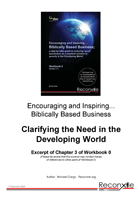Connect:
Exploring needs with networks in the Developing World
 A vital part of our success in Uganda was having a group of people there who we could trust and with whom we could talk things through. It was they who met us at the airport on our first ever visit, who had arranged a suitable low-cost hotel, who had worked out the people that they wanted us to meet, and who took us round to see those people and businesses. It was them who we asked if they would like us to deliver a training course on business; who organised the translation into the local language; who organised the venue for the training; and who invited the right people to come on the training. A vital part of our success in Uganda was having a group of people there who we could trust and with whom we could talk things through. It was they who met us at the airport on our first ever visit, who had arranged a suitable low-cost hotel, who had worked out the people that they wanted us to meet, and who took us round to see those people and businesses. It was them who we asked if they would like us to deliver a training course on business; who organised the translation into the local language; who organised the venue for the training; and who invited the right people to come on the training.
And now it is them who organise new training on a monthly basis; who get the materials printed and the notebooks ready; who deliver the training each Saturday morning, and who administer the small fund for covering those expenses. Without their commitment and ownership, we would have achieved precisely zero.
But there are thousands, perhaps millions, of groups like them all around the world. People who can recognise the need for local business training as a sustainable solution to poverty (either currently, or as soon as the idea is put before them) and who are willing to be the local agents to make it happen. Our challenge is to find them.
But that might not be as difficult as people think. Most of us who are likely to have an interest in this sort of work already have contacts in the Developing World, either directly, or though people we know, or through our church network. It is very rare these days for an active church in the developed world not to have links with mission partners, or even with sister churches in the Developing World. In fact many churches actually have members of their congregation who have been to a poor area somewhere in the world: perhaps as part of a trip organised by World Vision, or Compassion or Habitat for Humanity; or they have people who have active contact with charities like Tearfund, or Samaritans Purse, or ICR; or with mission agencies such as YWAM and CMS; or with denominational links, like the Anglican Communion.
Most churches would be hard pressed not to have someone in their congregation, who had a close connection with someone else, who had a personal link with somebody, somewhere in the Developing World. And that link will be able to tell you: How appropriate business training might be; who would have the most practical interest in making it happen; and how to get in contact with them.
 So this is the second area of need to which people might feel a calling: Understanding and clarifying the specific need in one small area of the Developing World. Guidance on this role can be found in Chapter 3 of Workbook 0 So this is the second area of need to which people might feel a calling: Understanding and clarifying the specific need in one small area of the Developing World. Guidance on this role can be found in Chapter 3 of Workbook 0
To understand more about Workbook 0, please click the highlighted link above, or to download just the appropriate chapter as a PDF, please click the picture to the right.
Click here to return to the roles overview. |
